About an exalted tone that has recently risen in philosophy
DOI:
https://doi.org/10.17533/udea.ef.339700Keywords:
Kant, philosophy, history of philosophy, Modern philosophyAbstract
The name of philosophy, after having lost its first meaning, that of a scientific wisdom of life, has very soon come to be in demand as a title for the ornamentation of understanding in thinkers beyond the common, for whom philosophy now represents a kind of unveiling of a mystery. For the ascetics of the desert of Macario, philosophy was their monasticism. The alchemist was called philosophus per ignem. The lodges of ancient and modern times are adept at a mystery transmitted by tradition, of which they jealously wanted to reveal nothing (philosophus per initiationem.) Finally, the most recent possessors of such a mystery are those who have it in themselves, although unfortunately they cannot enunciate and communicate it universally through language (philosophus per inspirationem). But if there were a knowledge of the supersensible (which from the theoretical point of view is only a true mystery), which is possible to reveal perfectly in the human understanding from a practical point of view, said knowledge, by proceeding from this understanding as a The faculty of knowledge by concepts, however, would remain much inferior with respect to that which could be perceived immediately by the understanding as a faculty of intuition, because by means of the first knowledge, the discursive understanding has to devote a lot of work, first to the analysis and then to the composition of his concepts according to principles, and to climb with difficulty many rungs to make progress in knowledge, while an intellectual intuition would understand and present the object immediately and suddenly.
Downloads
Downloads
Published
How to Cite
Issue
Section
License
Copyright (c) 1991 Immanuel Kant; Carlos Másmela Arroyave

This work is licensed under a Creative Commons Attribution-NonCommercial-ShareAlike 4.0 International License.
Authors who publish with this journal agree to the following terms:
1. The Author retains copyright in the Work, where the term "Work" shall include all digital objects that may result in subsequent electronic publication or distribution.
2. Upon acceptance of the Work, the author shall grant to the Publisher the right of first publication of the Work.
3. The Author shall grant to the Publisher a nonexclusive perpetual right and license to publish, archive, and make accessible the Work in whole or in part in all forms of media now or hereafter known under a Creative Commons Attribution-NoCommercia-ShareAlike (CC BY-NC-SA 4.0), or its equivalent, which, for the avoidance of doubt, allows others to copy, distribute, and transmit the Work under the following conditions: (a) Attribution: Other users must attribute the Work in the manner specified by the author as indicated on the journal Web site;(b) Noncommercial: Other users (including Publisher) may not use this Work for commercial purposes;
4. The Author is able to enter into separate, additional contractual arrangements for the nonexclusive distribution of the journal's published version of the Work (e.g., post it to an institutional repository or publish it in a book), as long as there is provided in the document an acknowledgement of its initial publication in this journal;
5. Authors are permitted, and Estudios de Filosofía promotes, to post online the preprint manuscript of the Work in institutional repositories or on their Websites prior to and during the submission process, as it can lead to productive exchanges, as well as earlier and greater citation of published work (see The Effect of Open Access). Any such posting made before acceptance and publication of the Work is expected be updated upon publication to include a reference to the Estudios de Filosofía's assigned URL to the Article and its final published version in Estudios de Filosofía.















